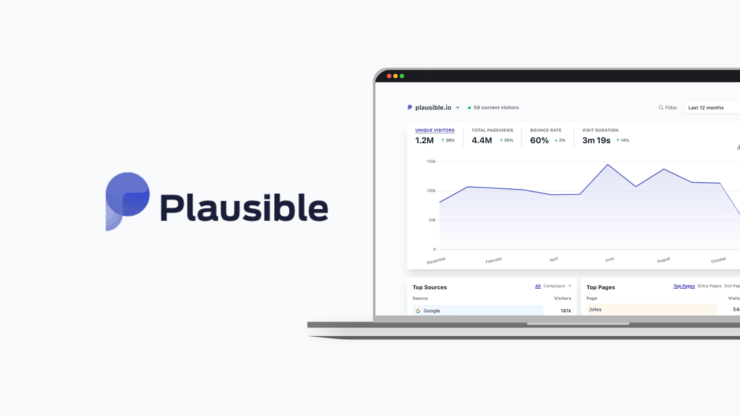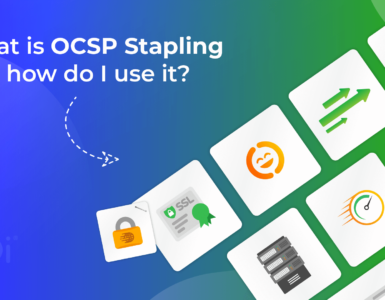Plausible is an open-source web analytics tool launched in 2019. It aims to be an alternative to Google Analytics for users who cherish data privacy for their website visitors. The project is made and hosted in the EU, uses no cookies and is fully compliant with GDPR, CCPA and PECR.
The end of Google Universal Analytics in 2023 has put a focus on alternative analytic tools. As we will be forced to make a change to Google Analytics 4 regardless, we’re more open to consider other tools. Combined with more awareness of data privacy on the internet, it means that tools like Plausible Analytics are a hot topic.
So we’re delighted to have the opportunity of an interview with Marco Saric, one of the co-founders of plausible.io.
Hi Marko, thanks for taking your time to talk to us. First, can you tell us a little bit about the story behind Plausible Analytics? Who is behind the project and what compelled you to start it?
Thanks for the invite! Plausible Analytics is a simple, open source, lightweight (< 1 KB) and privacy-friendly alternative to Google Analytics.
Plausible was launched in January 2019 by my co-founder Uku who is a developer. I joined him as a marketing co-founder in March 2020. Currently we’re a team of seven full time members.
We’re trusted by 9,000+ paying subscribers and are completely independent, self-funded and bootstrapped.
Both Uku and I had experience with Google Analytics and thought there was a space for a new and different way to do web analytics in our new world of GDPR and other privacy regulations.
Why you think it is so important that people use an alternative to Google Analytics?
Google Analytics dominates the web analytics industry. It is installed on the majority of sites. Everyone has some type of experience or opinion on it. Many people love it, many hate it.
There are some drawbacks to the way Google Analytics works. It is frustrating to use, difficult to understand, slow to load and privacy-invasive too. So basically by switching you not only get a more actionable dashboard that’s easier to understand, your visitors also get a better experience as they’re no longer tracked with invasive practices and they no longer need to be presented with all those consent banners on your site.
So we have aimed to position Plausible as a Google Analytics alternative for those that care about privacy, site speed and ease of use among other things. And because pretty much every website needs some type of analytics to work with, it has turned out that there is a pretty large market even for simplified and privacy focused analytics tools.
Is Plausible a solution for everyone or are there limitations?
Plausible is very opinionated which comes with some limitations in terms of what type of data we collect.
Even though we do try to provide all the essential insights that a website or business may need, our focus is on privacy-first web analytics. This means that we don’t use cookies and other long term identifiers. We don’t do any cross-site or cross-device tracking either. We have no connection to the adtech industry.
We minimize data collection too so there are not hundreds of different metrics and data points that we collect data about. Our dashboard is pretty simple and straightforward. There are no pages of reports, no layers of menus. Everything fits on one page.
A lot of Analytics users are worried about setting up their events and goals, no matter if they change to GA4 or go with an alternative.
How easy is it to recreate an existing setup in Plausible Analytics?
People tell us that our goals and custom events are more straightforward to set up than what they’re used to with Google Analytics. For instance, if you’re on WordPress or another one of the big CMS tools that support CSS class names, you can simply use their user interface to set up goals such as button clicks, purchases or form submissions. No JavaScript knowledge is needed for those sites to set up custom events with Plausible.
We also have some easy and automated event tracking such as external link clicks, file downloads and 404 error pages too.
Is it possible for agencies or web hosting resellers to run the software for multiple websites, and offer the reporting to their customers as a service?
Sure, that’s possible and one of the popular use cases for Plausible. We’ve built many features to accommodate agencies, consultants or other resellers.
- Embed dashboard allows you to embed our default dashboard (without Plausible branding) in your UI. You can even embed a specific filtered dashboard. This is the easy and quick option.
- Stats API allows you to take individual metrics and create a custom-built dashboard within your UI in whichever shape or form you want. This requires more development time from your side but you get full flexibility.
- Sites API allows you to add and manage a large number of sites programmatically.
- Proxy allows you to run Plausible as the first-party connection from your domain name so there are no third-party calls and you get more accurate stats as adblockers don’t block it.
- We also have a way to invite people you work with to view the dashboards and even a way to transfer site ownership which many agencies use. You set up a site in our system, do all the custom events etc and when it’s all done, you transfer the ownership to your client who then is responsible for the billing.
Plausible can be used in the Plausible Cloud via a subscription or self-hosted. Can you outline the advantages of each model and what kind of hosting requirements would be needed to self-host it?
The easiest way to get started with Plausible is with our official managed service in the Cloud. It takes 2 minutes to start counting your stats with a worldwide CDN, high availability, backups, security and maintenance all done for you by us.
Our managed hosting can save a substantial amount of developer time and resources. For most sites this ends up being the best value option and the revenue goes to funding the maintenance and further development of Plausible. So you’ll be supporting open source software and getting a great service!
For self-hosting, we provide the exact same software product but you basically do it all yourself. You need to get a server and you need to manage your infrastructure. You are responsible for installation, maintenance, upgrades, server capacity, uptime, backup, security, stability, consistency, loading time and so on.
The hosting requirements would depend on the volume of traffic you’re getting in general but also at peak times. It’s something you would need to actively manage and maintain. For our managed hosting, we put a lot of effort into making sure that your stats keep being tracked no matter the volume of traffic you’re getting and no matter where you visitors are based, so this is the kind of management and optimisation you need to do yourself when self-hosting.
The main benefit of self-hosting is that you can host your instance on any server in any country that you wish. Host it on a server in your basement or host it with any cloud provider wherever you want, even those that are not GDPR compliant.
For our managed hosting, all visitor data is exclusively processed on EU-owned cloud infrastructure. We keep your site data on a secure, encrypted and green energy powered server in Germany. This ensures that your site data is protected by the strict European Union data privacy laws and ensures compliance with GDPR. Your website data never leaves the EU.
Before we let you go, one more question for you as someone with lots of experience in running a project like this. What advice would you give someone wanting to create their own open-source app?
The main lesson I’ve learned about the open source aspect of things is to carefully choose the license for your software. There are many different types of licenses and benefits and drawbacks that come with it.
We started with one of those permissive licenses and soon after we gained some momentum we experienced some negative effects such as larger companies taking our code and making proprietary competitors.
We ended up changing our license to a copyleft license (AGPL) which requires corporations to open source the work they’re doing with our code. This has helped a lot to minimize any threats that could have killed our project early on before we became sustainable.
Thank you Marko for taking the time talking to us.
We are sure the subject of privacy-friendly analytics will be a hot topic for some time to come and we hope your project continues on its positive way as a good alternative to Google Analytics.
For everyone how want to know more, there are some links to specific content pages in the text above, and if you want to, here is the link directly to the homepage of Plausible Analytics.
If you are looking to self-host Plausible, or for any hosting you need – you know, 20i is always there for you.







Add comment